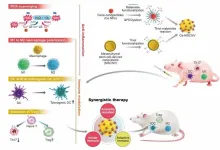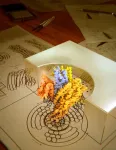(Press-News.org) Children who are too short for their age can suffer reduced cognitive ability arising from differences in brain function as early as six months of age, according to new research from the University of East Anglia.
Researchers compared the ‘visual working memory’ – the memory capacity that holds visual cues for processing – in children who had stunted growth with those having typical growth.
Published today in the journal Nature Human Behaviour, the study found that the visual working memory of infants with poor physical growth was disrupted, making them more easily distracted and setting the stage for poorer cognitive ability one year later.
Stunted growth had previously been linked with poor cognitive outcomes later in life, but this is the first time that this association has been found in infancy. It is also the first time stunted growth has been linked to functional differences in how the brain works in early development.
Led by Prof John Spencer of UEA’s School of Psychology, the team of researchers studied more than 200 children in the first ever brain imaging study of its kind.
“We expected that poor growth might impact cognition in early development, but it was striking to see this at the level of brain function,” said Prof Spencer.
“Typically-developing infants in our study showed engagement of a working memory brain network - and this brain activity predicted cognitive outcomes one year later. But the stunted infants showed a very different pattern suggesting that they were quite distractable.”
“This distractability was associated with a brain network typically involved in the allocation of attention to objects or tasks, suppressing distraction, and maintaining items in working memory” said Dr Sobana Wijeakumar, first author of the study. Dr. Wijeakumar is an Assistant Professor in the School of Psychology at the University of Nottingham.
The brain activity and cognitive abilities of the infants were assessed at six to nine months, and cognitive ability was followed up one year later. The results showed that infants with so-called ‘stunted growth’, often caused by poor nutrition or ill-health, had significantly poorer cognitive abilities at both stages than their typically-developing counterparts.
Interestingly, the children who bucked the trend and did well in their second year of cognitive testing despite having restricted growth were those whose visual memory had been unexpectedly strong at the six to nine months stage.
The discovery suggests that efforts to improve working memory and tackle distractibility in children during their crucial early months may reduce or prevent cognitive disadvantages later in life. This research also highlights the importance of studying brain function in early development.
The research was led by the University of East Anglia in collaboration with the University of Nottingham, the Community Empowerment Lab, Durham University, University of Iowa, Rhode Island Hospital, Brown University, and the Bill & Melinda Gates Foundation.
‘Stunting in infancy is associated with atypical activation of working memory and attention networks’ is published by Nature Human Behaviour.
This publication is based on research funded in part by the Bill & Melinda Gates Foundation. The findings and conclusions contained within are those of the authors and do not necessarily reflect positions or policies of the Bill & Melinda Gates Foundation.
Further funding came from the US National Institutes of Health and the Leverhulme Trust.
ENDS
EDITOR’S NOTES
1/ For more information or to request an interview, please contact the UEA communications office at communications@uea.ac.uk.
Prof John Spencer: j.spencer@uea.ac.uk
2/ A copy of the paper can be downloaded from the following Dropbox link: https://www.dropbox.com/scl/fo/x25r6jbwrpn853872xtkw/h?rlkey=0sbx2in5igaamnmub0ut6lc2l&dl=0
The DOI number for this paper will be 10.1038/s41562-023-01725-3. Once the paper has been published online, it will be available at the following URL: https://www.nature.com/articles/s41562-023-01725-3. This link will go live after the embargo ends.
3/ The University of East Anglia (UEA) is a UK Top 25 university (Complete University Guide and HESA Graduate Outcomes Survey) and a UK Top 30 university in the Sunday Times Good University Guide. It also ranks in the UK Top 20 for research quality (Times Higher Education REF2021 Analysis) and the UK Top 10 for impact on Sustainable Development Goals. Known for its world-leading research and good student experience, its 360-acre campus has won seven Green Flag awards in a row for its high environmental standards. The University is a leading member of Norwich Research Park, one of Europe’s biggest concentrations of researchers in the fields of environment, health and plant science. www.uea.ac.uk.
END
Stunting in infancy linked to differences in cognitive and brain function
2023-10-26
ELSE PRESS RELEASES FROM THIS DATE:
New nanoparticles found to be effective for the treatment of rheumatoid arthritis
2023-10-26
A team of scientists led by KOO Sagang from the Seoul National University and Center for Nanoparticle Research within the Institue for Basic Science Center (IBS), in collaboration with researchers from Korea Institute of Science and Technology (KIST) and the Seoul National University, developed a new solution for the treatment of rheumatoid arthritis (RA).
RA is a chronic disease that, unfortunately, has no cure. The disease triggers a mix of troublesome symptoms like inflamed joints, harmful cytokines, and immune system imbalances, which work together to create a relentless cycle of worsening symptoms. While targeting ...
Admissions for bronchiolitis at children’s hospitals before and during the pandemic
2023-10-26
About The Study: The results of this study of 41 large U.S. children’s hospitals suggest that bronchiolitis hospitalizations decreased transiently and then increased markedly during the COVID-19 pandemic era. Patients admitted during the pandemic era were older and were more likely to be admitted to an intensive care unit. These findings suggest that bronchiolitis seasonality has not yet returned to pre-pandemic patterns, and hospitals should prepare for the possibility of atypical timing again in 2023.
Authors: Jonathan H. Pelletier, ...
Parent-perceived benefits and harms associated with internet use by adolescent offspring
2023-10-26
About The Study: This survey study of attitudes of 1,005 parents of children and adolescents ages 9 to 15 revealed both perceived benefits (e.g., family connectedness) and concerns (e.g., cyberbullying, addiction) of internet use. Twice as many parents reported specific concerns about internet addiction than substance addiction.
Authors: Michael Peter Milham, M.D., Ph.D., of the Child Mind Institute in New York, is the corresponding author.
To access the embargoed study: Visit our For The Media website at this link https://media.jamanetwork.com/
(doi:10.1001/jamanetworkopen.2023.39851
Editor’s ...
How adults understand what kids are saying
2023-10-26
CAMBRIDGE, MA -- When babies first begin to talk, their vocabulary is very limited. Often one of the first sounds they generate is “da,” which may refer to dad, a dog, a dot, or nothing at all.
How does an adult listener make sense of this limited verbal repertoire? A new study from MIT and Harvard University researchers has found that adults’ understanding of conversational context and knowledge of mispronunciations that children commonly make are critical to the ability to understand children’s early linguistic efforts.
Using ...
DNA Origami nanoturbine sets new horizon for nanomotors
2023-10-26
Nanoturbines: the heart of advancements
Flow-driven turbines lie at the heart of many revolutionary machines that have shaped our societies, from windmills to airplanes. Even life itself depends critically on turbines for fundamental processes, such as the FoF1-ATP synthase that produces fuels for biological cells and the bacterial flagella motor that propels bacteria. “Our nanoturbine has a 25-nanometer diameter rotor made from DNA material with blades configured in a right-handed or left-handed sense to control the direction of rotation. To operate, this structure is ...
NSF awards up to $21.4M for design of next-gen telescopes to capture earliest moments of universe
2023-10-26
The National Science Foundation has awarded $3.7 million to the University of Chicago for the first year of a grant that may provide up to $21.4 million for the final designs for a next-generation set of telescopes to map the light from the earliest moments of the universe—the Cosmic Microwave Background.
Led by the University of Chicago and Lawrence Berkeley National Laboratory, the collaboration seeks to build telescopes and infrastructure in both Antarctica and Chile to search for what are known as “primordial” gravitational waves—the vibrations from the Big Bang itself. It would also map the microwave light ...
Malaria protein discovery offers path for novel antimalarial intervention strategies
2023-10-26
The discovery of a malaria protein that helps the parasite grow inside red blood cells and plays a key regulatory role in the parasite’s immune evasion tactics could pave the way for new vaccines or therapeutics to combat the deadly infection.
The protein, known as PfAP2-P, was previously identified in a KAUST-led study that explored malarial genes and proteins displaying rhythmic 24-hour expression patterns — an adaptation that allows the parasite to synchronize its activities with those of the host during the human blood stage of its developmental cycle[1].
The expression levels of PfAP2-P seem to peak first around ...
Psoriasis not caused by spontaneous mutations in skin cells
2023-10-26
Psoriasis — a chronic skin condition — is not caused or spread by spontaneous genetic mutations in the skin, new research suggests.
The team, from the Wellcome Sanger Institute and collaborators, sequenced skin samples from 111 people with psoriasis. They didn’t find any mutated genes in the psoriatic patches that weren’t also mutated in the individual’s unaffected skin tissue.
The study, published today (26 October) in Nature Genetics, suggests that unlike other inflammatory diseases, such as inflammatory bowel disease or chronic liver disease, somatic mutations were not responsible for the start or spread of psoriasis.
Confirming that psoriasis ...
Marine protected areas and climate change
2023-10-26
An international team has developed the first comprehensive framework for designing networks of marine protected areas that can help vulnerable species survive as climate change drives habitat loss.
In a paper published Oct. 26 in One Earth, the researchers outlined guidelines for governments to provide long-distance larval drifters, like urchins and lobsters, as well as migratory species, like turtles and sharks, with protected stopovers along coastal corridors. Led by Stanford marine conservation scientist Nur Arafeh-Dalmau, the team included 50 scientists and practitioners ...
Genetics links endometriosis and IBS
2023-10-26
University of Queensland researchers have shown that endometriosis and irritable bowel syndrome (IBS) share genetic risk factors, explaining why patients with one condition may also have the other.
Professor Grant Montgomery and Dr Sally Mortlock at UQ’s Institute for Molecular Bioscience found a significant relationship between the risks for endometriosis and common gastrointestinal disorders such as IBS, peptic ulcer disease (PUD) and gastro-oesophageal reflux disease (GORD).
“This genetic finding supports the clinical observation of an increased incidence of gastrointestinal disorders in women with endometriosis,” ...




